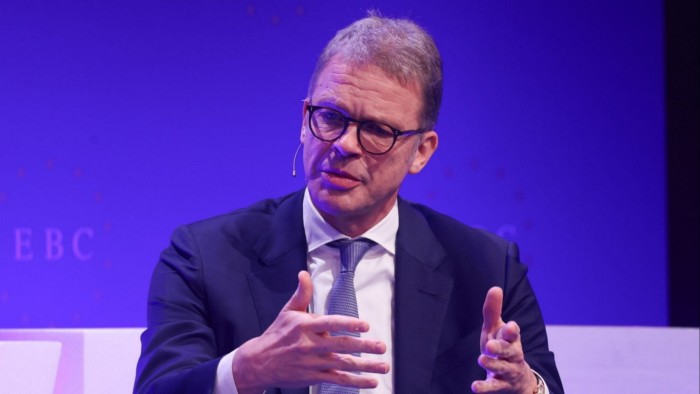Unlock the Editor’s Digest for free
Roula Khalaf, Editor of the FT, selects her favourite stories in this weekly newsletter.
Deutsche Bank chief executive Christian Sewing has said that German businesses need relief on regulation and a more competitive corporate tax regime to reboot growth in the country’s flagging economy.
“We clearly need certain structural reforms,” Sewing told the Financial Times global banking summit in London on Wednesday. “We need to have absolutely some relief on the regulation and red tape. That is important.”
He added that Germany needed to “rethink” its corporate tax regime, which he said was “not competitive”, and provide production companies with more certainty on energy prices.
The comments from Sewing, who has led Germany’s largest lender since 2018, come ahead of a snap election in the country in February. Europe’s largest economy has stagnated since 2021, creating discontent with Chancellor Olaf Scholz’s three-way coalition.
Despite the challenges facing Germany, Sewing said he was “actually quite positive” that the country’s economy would “find its way back to growth”.
Speaking about the country’s approach to its economy, he said: “It’s time to change, but I think a lot of people have understood that change is needed. And never forget, the underlying strength of corporates in Germany is still there, [there is] a lot of resilience.”
Separately, Deutsche’s domestic rival Commerzbank is facing a potential takeover bid from Italy’s UniCredit, which would be the biggest attempt at cross-border M&A in Europe’s banking sector since the financial crisis.
However, UniCredit’s approach has encountered fierce opposition from Germany’s political establishment and Commerzbank’s management has dismissed the advances from the Italian lender, which is led by seasoned dealmaker Andrea Orcel.
Sewing declined to comment on UniCredit’s stake-building in Commerzbank but said pan-European consolidation in the banking sector was a “logical trend” that was being delayed by a lack of progress on creating a European banking union.
Since the Eurozone crisis, which began in 2009, policymakers have been pushing for a set of Europe-wide bank rules that would allow lenders to operate in different countries seamlessly. But little progress has been made.
“We need to have a more harmonised regulation,” Sewing said on Wednesday. “We need to actually lay the foundation in order to allow for more consolidation, and that has not yet fully happened.
“Before the real wave [of cross-border consolidation] starts, we need to have further foundations met, in particular on the banking union.”
It was “very difficult” for Deutsche, which is active in about 15 European countries, to shift liquidity from one country to another because of national liquidity rules, the 54-year-old added.
Read the full article here

